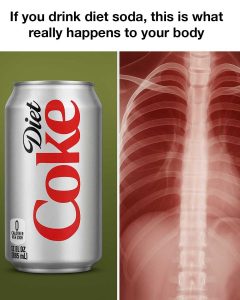Diet soda has long been a go-to beverage for people who want the fizzy, sweet taste of soda without the added calories. Since its rise in popularity in the late 20th century, it has become a fixture in the lives of those trying to manage their weight, reduce sugar intake, or simply make what seems like a healthier choice. Brands like Diet Coke, Pepsi Zero Sugar, and others have found their way into refrigerators and restaurant menus across America. But behind the promise of zero calories lies a more complex story. What actually happens when you drink diet soda regularly? Let’s take a deeper look.

To understand its impact, it’s essential to know what’s inside a can of diet soda. The basic ingredients include carbonated water, artificial sweeteners, flavorings, acids, and preservatives. Common sweeteners like aspartame, sucralose, and saccharin are used because they are hundreds of times sweeter than regular sugar, allowing manufacturers to achieve the sweet taste without calories. These sweeteners don’t add energy to your diet, but their interaction with the body is not as straightforward as you might think. Additional ingredients like phosphoric acid and citric acid give the drink its tang and help preserve it. Many diet sodas also contain caffeine for an extra energy boost.
Artificial sweeteners work by stimulating the same taste receptors that sugar does, tricking your brain into thinking it’s consuming something sweet. Aspartame, for instance, is about 200 times sweeter than sugar and is broken down into naturally occurring compounds in the body. Sucralose, however, passes through the body undigested. While all of these are considered safe by the FDA, the long-term effects of consuming them regularly are still under scientific investigation, with some studies pointing to possible concerns.
Now let’s dive into ten potential effects diet soda might have on your health.
First, it could interfere with your metabolism and weight control efforts. Although diet sodas are calorie-free, some research suggests they may not help with weight loss and could even contribute to weight gain. The brain receives the sweet signal but no calories, which may lead to confusion in appetite regulation and increased cravings for sugary foods, ultimately causing you to eat more than you intended.
Second, it may affect your blood sugar and insulin sensitivity. Artificial sweeteners, despite not raising blood sugar directly, can change the way your body handles glucose. Some studies have linked diet soda with increased insulin resistance, which is a known risk factor for developing type 2 diabetes.
Third, it can influence your cravings. The intense sweetness of diet soda may reset your taste preferences, making naturally sweet foods like fruits seem less appealing. Over time, this can lead you to crave processed, high-sugar snacks instead, undermining your health goals.
Fourth, there are questions about heart health. Some observational studies have suggested that regular diet soda consumption may be linked to an increased risk of heart disease and stroke. The mechanisms are unclear, but the combination of artificial sweeteners and other chemical additives could play a role.
Fifth, it may impact your bones. Phosphoric acid, which gives many sodas their tang, has been shown to interfere with calcium absorption. This could lead to lower bone mineral density over time, increasing the risk of osteoporosis and fractures, especially in older adults.
Sixth, diet soda can harm your teeth. Even though it lacks sugar, it’s still highly acidic. This acidity can weaken tooth enamel, leading to sensitivity and making your teeth more vulnerable to cavities and decay. Regular drinkers may notice more dental issues despite avoiding sugary sodas.
Seventh, it could affect your gut health. Some research points to the possibility that artificial sweeteners may negatively alter the balance of your gut microbiome—the trillions of bacteria in your digestive system that help regulate digestion, immunity, and even mood. A disrupted microbiome may contribute to bloating, digestive discomfort, and other health concerns.
Eighth, it may impact your brain. While the research is still emerging, a few studies have explored potential connections between artificial sweeteners and brain health. Some researchers have raised concerns about links to headaches, mood changes, and even long-term cognitive effects, though the evidence remains inconclusive.
Ninth, your kidneys might be at risk. Some research has linked high consumption of diet soda to a decline in kidney function, especially in women. The additives and sweeteners used may place stress on the kidneys over time, although more studies are needed to fully understand this relationship.
Tenth, and finally, it may affect your hydration and electrolyte levels. While diet soda can technically hydrate you, it lacks the nutrients and electrolytes found in water or electrolyte drinks. Plus, the caffeine in many diet sodas can have a mild diuretic effect, meaning it can lead to increased urination and potential dehydration if consumed in large amounts without balancing it with water intake.
So, what’s the bottom line? Diet soda can be a useful alternative if you’re trying to cut down on sugar and calories, but it’s not without potential risks. Occasional consumption likely won’t cause harm for most people, but relying on it as your go-to drink might not be the healthiest choice in the long run. It’s easy to assume that zero calories equals zero problems, but that isn’t necessarily true when it comes to artificial ingredients and their effects on the body.
If you’re looking for healthier drink options, consider switching to water, sparkling water with natural flavors, herbal teas, or water infused with fruits and herbs. These choices can keep you hydrated without the artificial additives and help support your overall health.
In the end, moderation is key. Being informed about what you consume allows you to make better choices for your body and long-term wellness. Diet soda doesn’t have to be entirely off-limits, but it shouldn’t be your main source of hydration. By mixing in healthier beverages and limiting your intake of artificially sweetened drinks, you can stay refreshed and protect your health at the same time.





